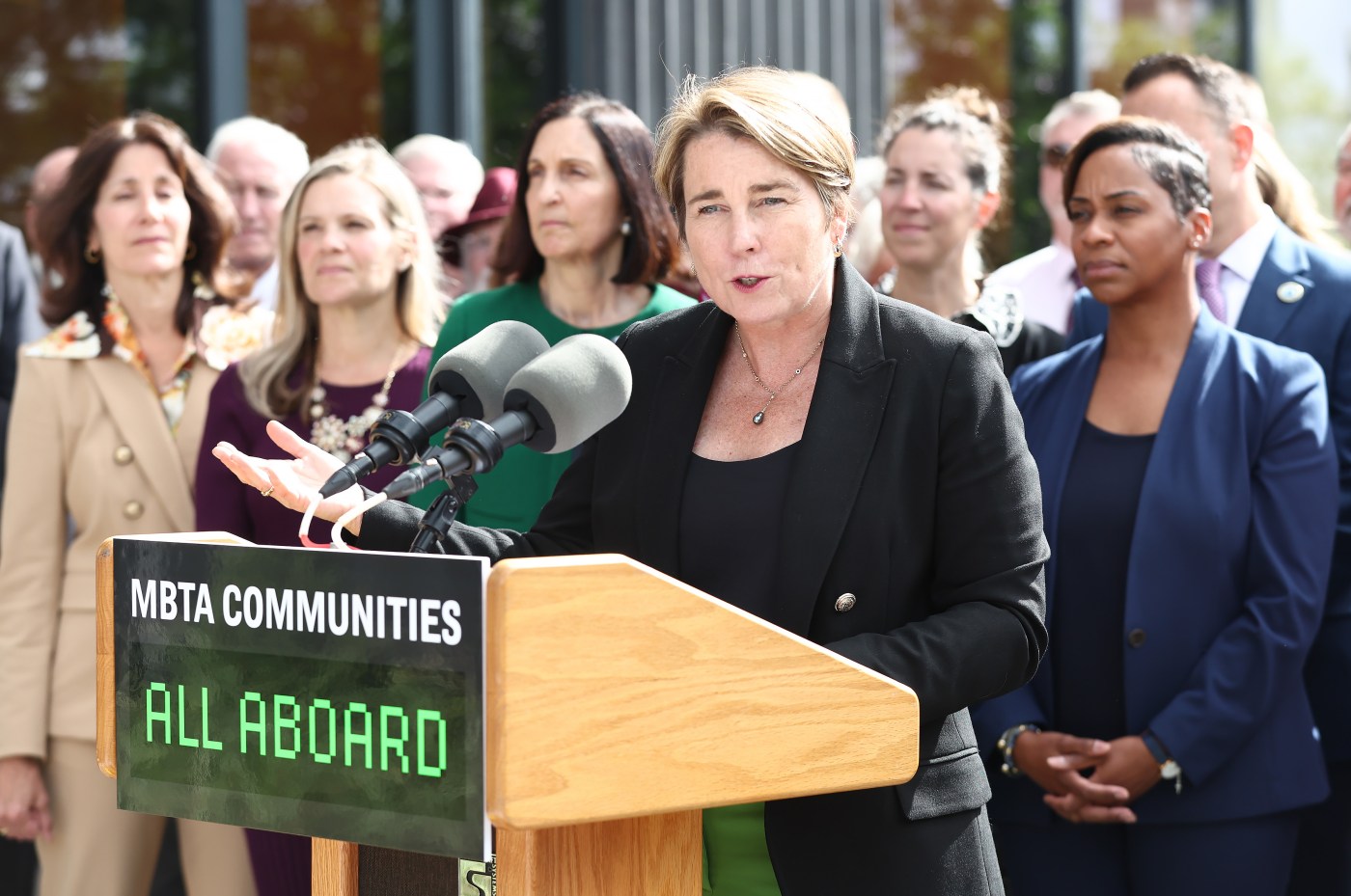
Massachusetts Gov. Healey ‘cannot commit’ to funding towns fighting MBTA zoning law
Gov. Maura Healey says she doesn’t want to see Massachusetts cities and towns “penalized” because of the controversial MBTA zoning law but is not backing away from withholding grants from resistant communities.
The governor says she “cannot commit” that her administration will “refrain from withholding funding” from cities and towns that have voted against complying with the 2021 law that state Auditor Diana DiZoglio recently determined is an “unfunded mandate.”
Resistance has mounted as more municipalities file lawsuits against the Healey administration, and the state remains reluctant to provide insight on how compliance with the law will impact cities and towns financially.
Communities can seek a Superior Court order exempting them from compliance until the state provides funding under the auditor’s unfunded mandate determination. Wrentham filed a suit last week after Middleboro and Marshfield sued the administration days after the ruling was issued.
The MBTA Communities Act requires 177 municipalities across Greater Boston to have at least one zoning district where multifamily housing is permitted as of right. Roughly 120 cities and towns have met compliance.
State Rep. Patrick Kearney, who represents several South Shore towns, highlighted in a legislative budget hearing how Marshfield has lost access to a $261,600 grant to dredge the North River, which he said also impacts Scituate, Norwell, Hanover, Pembroke and Rockland.
“No, I cannot commit that,” Healey told Kearney when he asked the governor if her administration would stop withholding previously committed state funding. “I think the lawsuit … is without legal merit. I respect the opinion of the attorney general. But that will be left for the courts.”
In the hearing, budget writers struggled to grapple with the impacts of President Donald Trump’s efforts to reduce the size of the federal government and slash large amounts of federal funding on Healey’s $62 billion fiscal year 2026 state budget.
Marshfield won the award in December, with the funding designated to support “the permitting and design for the Marshfield and Scituate North/South River Dredging project, which will provide better marina access for public boat ramps, boatyards, and local bait shops.”
Kearney is urging his constituents to reach out to the governor and ask her to release the dredging funds.
“This decision penalizes multiple communities for something beyond their control and jeopardizes the safety of residents in one of the most dangerous inlets on the eastern seaboard,” Kearney wrote in a Facebook post on Saturday.
“Instead of withholding critical funding that would benefit the environment and improve public safety,” he added, “Governor Healey should be focusing on providing the support necessary to keep our coastal communities and their watersheds, safe.”
Marshfield filed its lawsuit in Plymouth Superior Court on Feb. 27 against the state and the state Executive Office of Housing and Livable Communities. The town of roughly 26,000 people rejected zoning plans that would’ve met compliance last April and December.
Middleboro filed its suit a day after Marshfield, with officials arguing the state “incorrectly declared” the Plymouth County town “non-compliant” and that they’ve gone above and beyond in their effort to create affordable housing.
Healey and the state housing have rescinded a $73,000 grant for student mental health needs in Middleboro and are refusing to sign a $2.8 million MassWorks contract for commercial development infrastructure, town officials have said.
DiZoglio has alleged the Healey administration has “politically weaponized” her office over the “unfunded mandate” determination. The ruling stemmed from how the law “does not provide a funding mechanism for compliance with its provisions” and that the Legislature failed to provide an appropriation when approving it.
Healey and Attorney General Andrea Campbell have said DiZoglio’s claim is wrong and does not affect the law being implemented.
“Our determination has been mischaracterized as an endorsement for noncompliance. It is not that,” Auditor General Counsel Michael Leung-Tat said in Thursday’s legislative budget hearing. “It’s just that it is an unfunded mandate.”
The state housing office has set up a grant program to help cities and towns comply, but DiZoglio’s office has said that the support doesn’t fulfill the Local Mandate Law because it is “discretionary funding.” That means communities must apply to receive the funds that help cover consultant costs during planning and design.
“I have been very disappointed recently with some who wish we would just cover this issue,” DiZoglio said Thursday, “because it’s not politically expedient for some of our viewpoints and some of the things that we want to see accomplished.”
Healey said her administration has “provided technical assistance to communities to help them work through some of this.”
“We’ve said it’s not one size fits all,” the governor said. “Recently, there were communities that weren’t in compliance that now have made steps toward compliance and we’ve said, ‘Let the funds go, because you’re on track.’”
Wrentham, a Norfolk County town with a population of 11,000, sued the state on Thursday, “seeking relief from enforcement” and “important fiscal impact information on MBTA zoning compliance.”
The Select Board has argued that zoning at least 50 acres near downtown for multi-family housing, with 15 units per acre and a capacity of 750 units, could lead to a 13% population increase.
DiZoglio has said her office “cannot conduct” a fiscal analysis until the state housing office files a “fiscal effect” estimate and small business impact statement under a legal requirement that the state Supreme Judicial Court authorized in January.
The SJC ruling came in a legal fight between Campbell and the town of Milton in which the court declared the law constitutional and enforceable.
“The Wrentham Select Board determined that the most practical and fiscally responsible way to compel the Commonwealth to provide the necessary financial information on impacts to education, public safety, and public works was to file suit in Superior Court,” Wrentham Town Manager Michael King said in a statement on Thursday.


